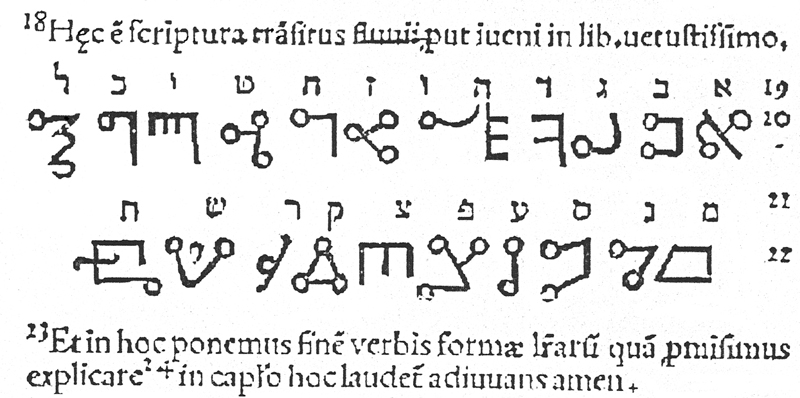Transitus Fluvii ("passing through the river" in Latin) or Passage Du Fleuve (in French) is an occult alphabet consisting of 22 characters described by Heinrich Cornelius Agrippa in his Third Book of Occult Philosophy (Cologne, 1533, but written around 1510). It is derived from the Hebrew alphabet and is similar to the Celestial and Malachim alphabets. The name may refer to the crossing of the Euphrates by the Jews on their return from Babylon to rebuild the Temple.
| Attributes | Values |
|---|
| rdf:type
| |
| rdfs:label
| - Transitus Fluvii (es)
- Transitus Fluvii (fr)
- Transitus Fluvii (en)
|
| rdfs:comment
| - Transitus Fluvii est un alphabet ésotérique de 22 caractères décrit par Heinrich Cornelius Agrippa dans son Troisième Livre de De occulta philosophia (1513). Il dérive de l’alphabet hébreu et est semblable à l’Alphabet Célestial et à l’alphabet Malachim. Le nom doit faire référence au passage de l’Euphrate par les Hébreux à leur retour de Babylone pour reconstruire le temple. Il est fait mention de l’alphabet Transitus fluvii dans le film Le Projet Blair Witch. (fr)
- Transitus Fluvii ("Cruce del río", en latín), es un alfabeto oculto consistente de 22 caracteres descritos por Heinrich Cornelius Agrippa en su (Colonia, 1533, pero escrito alrededor de 1510). Deriva del alfabeto hebreo y de sus similares, el Celestial y el Malachim. El nombre hace referencia al cruce que hizo la comunidad judía a través del río Éufrates durante su regreso de Babilonia para reconstruir el Templo. Giovanni Agostino Panteo relata que mientras el alfabeto hebreo fue confiado a Moisés, el enochiano fue entregado a Enoc y el Transitus Fluvii a Abraham. (es)
- Transitus Fluvii ("passing through the river" in Latin) or Passage Du Fleuve (in French) is an occult alphabet consisting of 22 characters described by Heinrich Cornelius Agrippa in his Third Book of Occult Philosophy (Cologne, 1533, but written around 1510). It is derived from the Hebrew alphabet and is similar to the Celestial and Malachim alphabets. The name may refer to the crossing of the Euphrates by the Jews on their return from Babylon to rebuild the Temple. (en)
|
| name
| |
| foaf:depiction
| |
| dcterms:subject
| |
| Wikipage page ID
| |
| Wikipage revision ID
| |
| Link from a Wikipage to another Wikipage
| |
| Link from a Wikipage to an external page
| |
| sameAs
| |
| sisters
| |
| dbp:wikiPageUsesTemplate
| |
| thumbnail
| |
| creator
| |
| fam
| |
| imagesize
| |
| languages
| |
| time
| |
| type
| |
| has abstract
| - Transitus Fluvii ("Cruce del río", en latín), es un alfabeto oculto consistente de 22 caracteres descritos por Heinrich Cornelius Agrippa en su (Colonia, 1533, pero escrito alrededor de 1510). Deriva del alfabeto hebreo y de sus similares, el Celestial y el Malachim. El nombre hace referencia al cruce que hizo la comunidad judía a través del río Éufrates durante su regreso de Babilonia para reconstruir el Templo. Este alfabeto puede ser encontrado en la obra de denominada Peculium Abrae. Grammatica hebraea una cum latino, Venecia, 1523, sig. B6v. También encontramos referencias en el libro de Geoffroy Tory, Champ Fleury, Paris, 1529, f. 76v ubi tamen: “Lettres Chaldaiques” y en la obra de llamada Voarchadumia contra alchimiam, Venecia, 1530, pp. 545–46. Giovanni Agostino Panteo relata que mientras el alfabeto hebreo fue confiado a Moisés, el enochiano fue entregado a Enoc y el Transitus Fluvii a Abraham. (es)
- Transitus Fluvii est un alphabet ésotérique de 22 caractères décrit par Heinrich Cornelius Agrippa dans son Troisième Livre de De occulta philosophia (1513). Il dérive de l’alphabet hébreu et est semblable à l’Alphabet Célestial et à l’alphabet Malachim. Le nom doit faire référence au passage de l’Euphrate par les Hébreux à leur retour de Babylone pour reconstruire le temple. Il est fait mention de l’alphabet Transitus fluvii dans le film Le Projet Blair Witch. (fr)
- Transitus Fluvii ("passing through the river" in Latin) or Passage Du Fleuve (in French) is an occult alphabet consisting of 22 characters described by Heinrich Cornelius Agrippa in his Third Book of Occult Philosophy (Cologne, 1533, but written around 1510). It is derived from the Hebrew alphabet and is similar to the Celestial and Malachim alphabets. The name may refer to the crossing of the Euphrates by the Jews on their return from Babylon to rebuild the Temple. This alphabet can also be found in Abraham de Balmis Peculium Abrae. Grammatica hebraea una cum latino, Venetiis, 1523, sig. B6v.as well as in Geoffroy Tory, Champ Fleury, Paris 1529, f. 76v ubi tamen: "Lettres Chaldaiques", and Giovanni Agostino Panteo's (Pantheus) Voarchadumia contra alchimiam, Venice, 1530, pp. 545–46. Pantheus claims that, while the Hebrew alphabet was entrusted to Moses and Enochian to Enoch, the Transitus Fluvii was entrusted to Abraham. (en)
|
| sample
| |
| gold:hypernym
| |
| prov:wasDerivedFrom
| |
| page length (characters) of wiki page
| |
| foaf:isPrimaryTopicOf
| |
| is Link from a Wikipage to another Wikipage
of | |
| is Wikipage redirect
of | |
| is foaf:primaryTopic
of | |

![http://dbpedia.org/describe/?url=http%3A%2F%2Fdbpedia.org%2Fresource%2FTransitus_Fluvii]()



![[RDF Data]](/fct/images/sw-rdf-blue.png)



![[RDF Data]](/fct/images/sw-rdf-blue.png)





![[cxml]](/fct/images/cxml_doc.png)
![[csv]](/fct/images/csv_doc.png)
![[text]](/fct/images/ntriples_doc.png)
![[turtle]](/fct/images/n3turtle_doc.png)
![[ld+json]](/fct/images/jsonld_doc.png)
![[rdf+json]](/fct/images/json_doc.png)
![[rdf+xml]](/fct/images/xml_doc.png)
![[atom+xml]](/fct/images/atom_doc.png)
![[html]](/fct/images/html_doc.png)